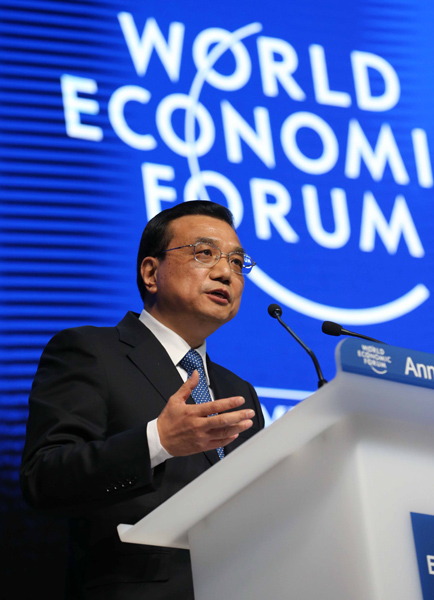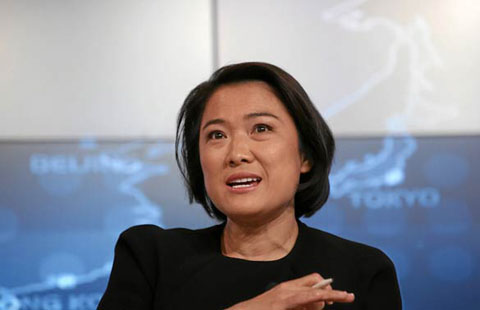Li's Davos speech draws praise
Updated: 2015-01-23 00:25
By Ji Tao, Fu Jing and Zhang Chunyan in Davos, Switzerland(chinadaily.com.cn)
|
||||||||
 |
|
Chinese Premier Li Keqiang delivers a keynote speech at the World Economic Forum (WEF) annual meeting in Davos, Switzerland, on Wednesday. [Photo / Xinhua] |
Global business leaders and analysts comment on Premier Li Keqiang's keynote speech at the World Economic Forum annual meeting on Wednesday.
Niels B. Christiansen, CEO of Danfoss in Denmark
Premier Li’s message is very encouraging. It’s undoubted that China is acting very important role globally and has great influence on Europe and the whole world, not only by economic exchanges, but also via cooperation with companies like Danfoss. China grew up year by year and now has been one of the biggest and most influential economy around the world. After entering WTO, China increased economic exchanges and interaction with the whole world, which helped China win global market and brought more valuable and high-quality products to Chinese people.
From Danfoss’ perspective, we came into China for almost 20 years and we see China as our second home market, which make us invest more in China and achieve more here. In the past 20 years, China has become the third largest market of Danfoss. China has the second largest number of employees among all countries where Danfoss has a presence. China is the largest sourcing market for Danfoss. The great ambitions among Chinese leaders are one of the main reasons that today we have some of our most highlighted energy efficiency cases in China.
We all know that 2015 is the last year of the 12th Five-year Plan of China. China is willing to establish a sustainable society, speed up urbanization in a sustainable way and maintain social stability in 2015 and beyond. This is a very good match to our ambition as a company: To help the world, and certainly also China, to make more with less in areas such as food, energy, infrastructure and climate.
Peter Maurer, president of the International Committee of the Red Cross
It resonates a lot when the Chinese premier mentions how important the (global) environment is for growing and sustainable economy. It's something which we relate a lot with the Chinese authority, and we had excellent cooperation with China on that message, so I think it's very encouraging.
The second thing I extremely appreciate is the tone of realism, and sort of like Eurasianist statement, in his speech. It came to me as a strong message that we know who we are, where we are, where we will go, maybe there will be some difficulties. So he didn't make a promise to the world which cannot be fulfilled. But it seems to me he is not under-ambitious either. So he has a vision, but it's a realistic vision.
Nariman Behravesh, chief economist of IHS, a consulting firm based in Switzerland
Premier Li clearly is a trained economist and he spoke in a way that I think really reached out to this audience. They want to know some specifics, for example, what are China's goals, how it's going to get there. He raised a number of issues. He talked about integration, free trade and sustainable growth rate, very important for this audience. He talked about China willing to trade off a little bit of growth for the focus on reforms, again very important.
He spoke with energy, with passion. I think it's important for Premier to talk about geopolitics and terrorism at the very beginning. These are crucial aspects that these delegates are worried about. They worry about economy but unfortunately the two issues are intruding as they were so we have to deal with them. So I think it's right for him to focus on that first.
Karel Lannoo, executive director of Brussels-based think tank Centre for European Policy Studies
China's role is very important, for Europe, the US and the rest of the world. My confidence would be based on the fact that in the past 20 years, China has managed it well, and it has the necessary buffers to stimulate the economy.
Flemming Christiansen, professor and chair of political sociology at University of Duisburg-Essen in Germany
I have followed China's development as a keen observer since it started in 1978, and I think Premier Li is right to say that the initial rural reforms (1978-1983) represented a first example of what is still at the center of the efforts to develop China's political economy: unleashing the force of mass entrepreneurship and innovation using what he calls the "laws of the economy" and maintaining a firm guiding and facilitating role of the government.
David Fouquet, senior associate at European Institute of Asia Studies in Brussels
The world is wondering if China can remain the engine of growth if it slows down. To my mind there is still considerable growth potential, but it also depends on how the markets respond and whether China continues to import and invest outward.

 Northeastern US braces for 'crippling' blizzard
Northeastern US braces for 'crippling' blizzard
 At least 2 dead, dozens hurt after bus hits road barrier
At least 2 dead, dozens hurt after bus hits road barrier
 Red carpet of 21st annual SAG Awards in Los Angeles
Red carpet of 21st annual SAG Awards in Los Angeles
 New Year celebrated with dance mix
New Year celebrated with dance mix
 Businesswomen shine at the World Economic Forum
Businesswomen shine at the World Economic Forum
 Dogs compete at the Siberean Cup
Dogs compete at the Siberean Cup
 The world in photos: Jan 19-25
The world in photos: Jan 19-25
 Drama with a twist
Drama with a twist
Most Viewed
Editor's Picks

|

|

|

|

|

|
Today's Top News
Beijing gears up for Super Bowl
Rock-Paper-Scissors: Paper wins
10 million new jobs on way in China, Li vows
Chinese plan NJ's tallest building
Obama's trip to India spurs triangle chatter
Motorola to make phones in Tianjin
High abortion rate triggers fears for young women
Small drone crashes on White House
US Weekly

|

|







